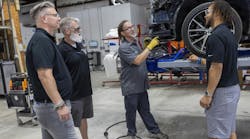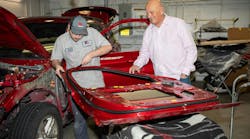Repair Standards Spark Heated Discussion at CIC
PALM SPRINGS, Jan. 25, 2013—Starting with a heated open-floor discussion and carried on through an hour-long advisory panel, the issue of industry repair standards dominated the final day of the Collision Industry Conference’s (CIC) annual planning meeting in Palm Springs, Calf., on Friday.
CIC chairman George Avery stated that no decision will be made on the part of the conference regarding the issue until April’s meeting in Phoenix. Friday’s discussion was meant to be just that—a discussion, an opportunity to gather information to make an informed decision down the road.
And there were a lot of opinions about the direction the industry should go.
Representatives from the Society of Collision Repair Specialists (SCRS), which held a closed-door, repairers-only meeting Thursday evening, started the meeting by posing a question to Avery: Does CIC confirm and recognize OE repair standards as the standard for the industry?
From there, the debate raged on.
Gaps in the OE process of creating repair standards were a concern brought up by Avery and by a number of others in the room. Some said that the OE standards are already sufficient, but there is no methodology for ensuring that facilities adhere to these standards. Some said there needs to be a third-party regulator. Some said repairers don’t need an extra body looking over their shoulders.
“It’s about finding a solution set” for implementing, recognizing and ensuring standards, said Aaron Schulenburg, executive director for SCRS and a member of the morning’s panel.
Also on the panel was Mike Monaghan, who helped create industry standards in the U.K.
“If you don’t know what good looks like, we’ll be here again in 15 years,” Monaghan said, urging the need for strict business standards in the industry that would weed out shops that do not adhere to correct practices of repair and business operations.
“When you have 38,000 shops across the U.S.A., you have to be honest and say that a good majority of those shops should not be practicing collision repair today,“ he added, saying many shops practice unsafe and unprofessional habits.
Monaghan suggests a level of standards similar to those in place in the U.K., which begin with a focus on a shop’s overall makeup.
The debate carried over from various polling questions Thursday afternoon using CIC’s new automated response system. In a survey of the more than 200 industry professionals in attendance Thursday, nearly 80 percent said they feel a third party is needed to enforce standards in the industry.
That seemed to be the only unanimous point of agreement throughout the discussion: There needs to be something in place to ensure that standards—whatever they may be, and wherever they eventually come from—are required in all shops.
At one point during the panel’s discussion, moderator Russell Thrall III had the audience raise their hands if in favor of supporting and recognizing OE standards. Nearly everyone in attendance raised their hands.
Schulenburg said that was even more proof of needing the recognized procedures put in use.
“Just because everyone raised their hand in a room doesn’t mean they practice what they preach,” he said. “There are a lot of people who raised their hand in this room that don’t pay for OE procedures.”



